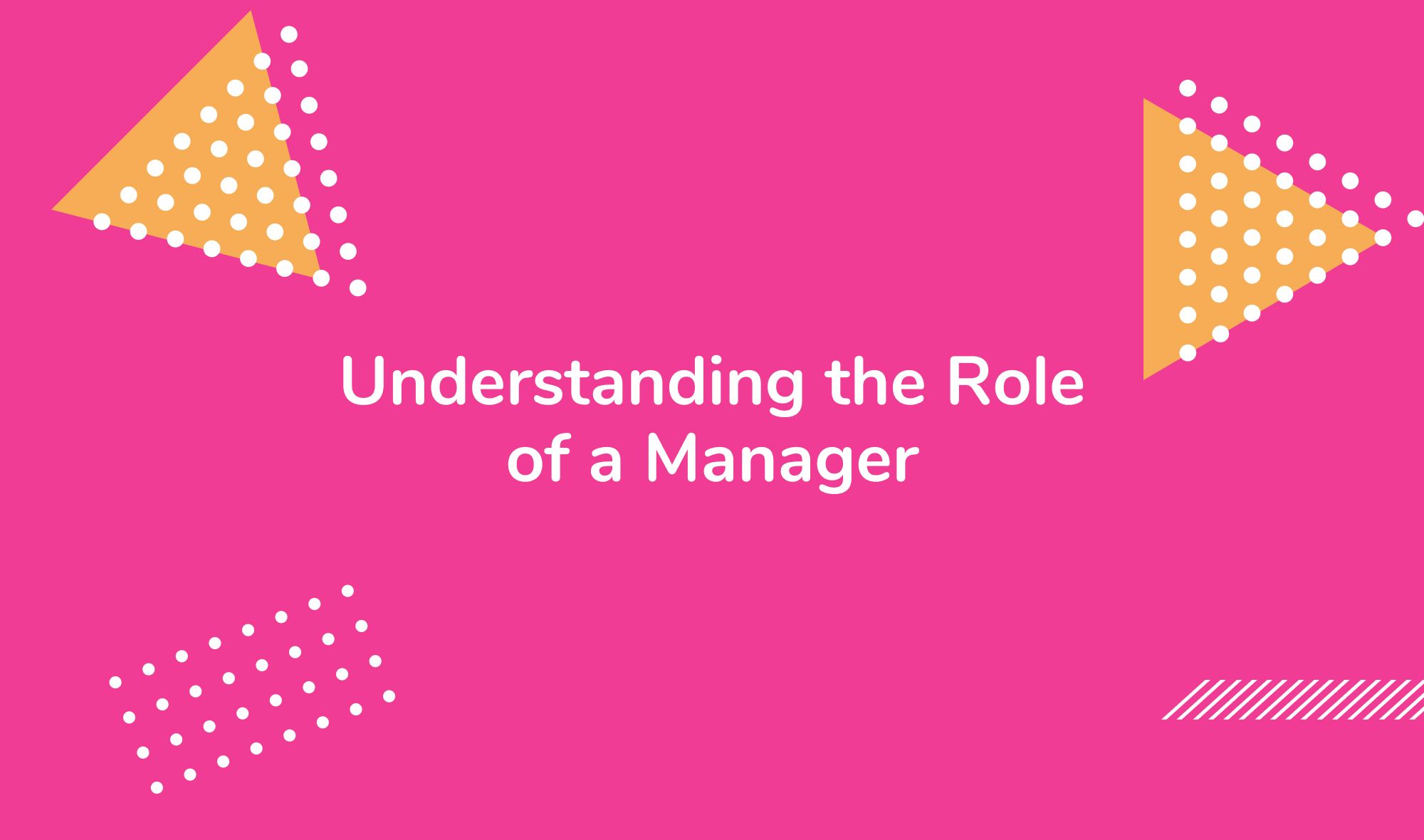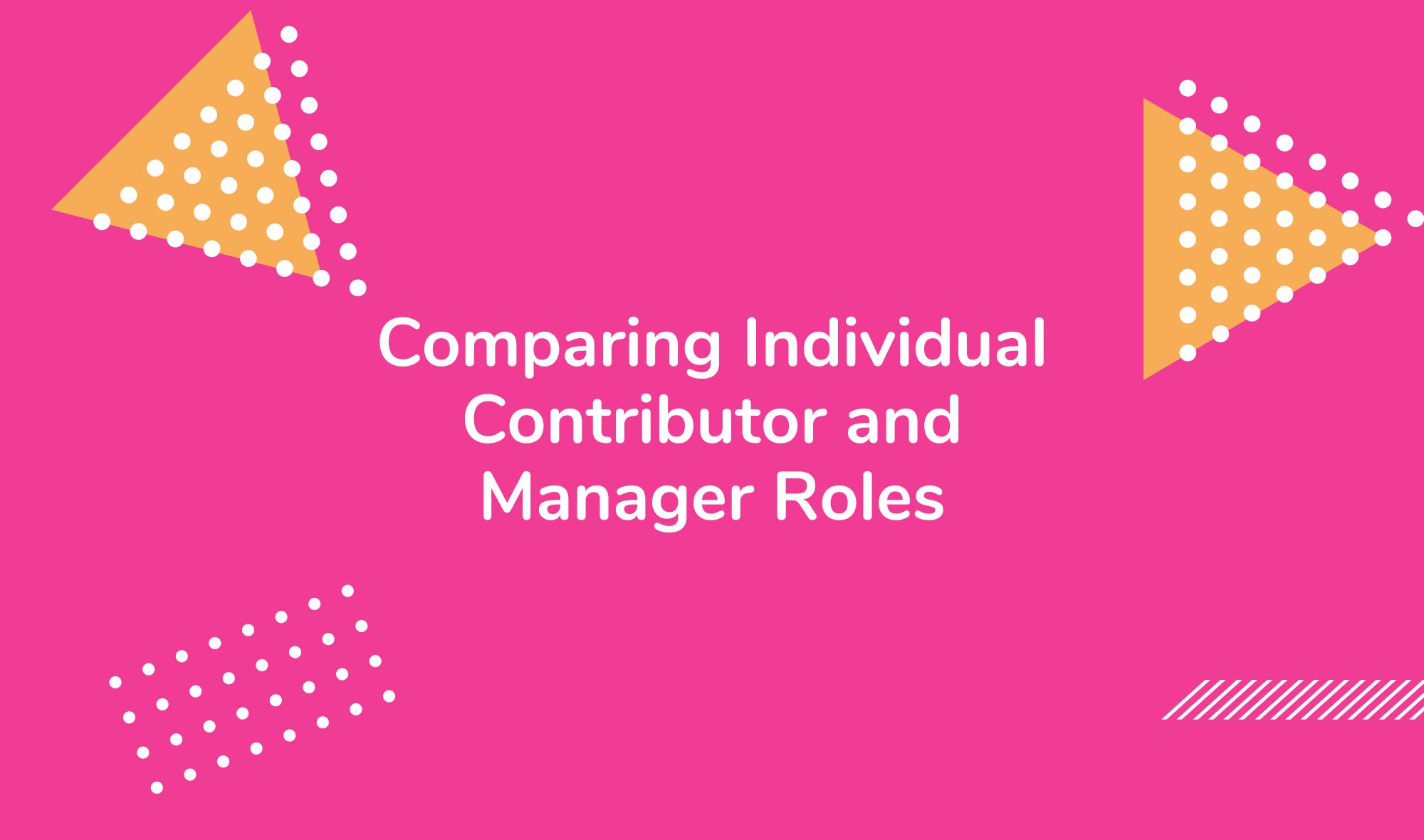Individual Contributor vs Manager: Which Path Suits You Best?
By Remy Meraz • June 16, 2023
Key Takeaways
- Individual contributors focus on executing tasks, while managers oversee teams and align efforts with business goals.
- Both roles require distinct skillsets and have unique challenges and benefits.
- Individual contributors can also exercise leadership in their roles.
- Career paths should align with personal skills, aspirations, and interests.
- Transitioning from individual contributor to manager requires self-awareness, professional development, and continuous learning.

From the day you step into your first job as an individual contributor, your career path may be filled with opportunities for growth and advancement. Some may find their calling in mastering their craft, becoming specialist staff members with a laser focus on their work. Yet, others may hear the call of leadership, aspiring to become managers who guide their teams toward shared success.
As your career develops, the transition from an individual contributor to a manager can be a pivotal step. This journey is not merely a promotion—it's a complete shift in roles and responsibilities. You will transition from primarily focusing on your tasks and competencies, to developing managerial skills that inspire progress and boost team performance.
However, this transition is not without its challenges. It requires tactical agility, technical prowess, and the flexibility to adapt to ever-changing work environments. Each of these skills and attributes play a significant role in both individual and collective success.
In this article, we will explore the nuances of this transition, providing valuable insights to help you succeed in your new managerial role. By reading books recommended for new managers, and leveraging resources specifically designed for people in transition, you can build a strong foundation for your leadership journey.
For comprehensive guidance on training successful leaders, you can explore our blog post on First Time Manager Training: How to Train Successful Leaders for valuable insights and strategies.
Through articles and resources from Zella Life, you will gain a deeper understanding of the role of a manager and how to leverage your abilities and skills to unlock the potential for both you and your team's success. This is your first step towards embracing your new role and achieving unprecedented career growth. Let's get started on your path to becoming an effective manager.
Join our Newsletter
Transform your career with our personal growth insights. Get one valuable tip right in your inbox every Saturday morning.
Understanding the Role of an Individual Contributor
What does it mean to be an Individual Contributor?
An individual contributor, often referred to as an employee, specialist, or staff member, plays a critical role in any organization. They are the technical experts, the operational geniuses, and the functional specialists that power the progress of any business. Individual contributors are generally responsible for executing specific tasks and projects, without the managerial duties that come with leading a team.
Essential Skills of an Individual Contributor
As an individual contributor, you need to harness a variety of skills. Among them, technical skills are paramount as they enable you to excel in your field of expertise. However, beyond technical knowledge, you must also demonstrate adaptability, versatility, and a hands-on, practical approach. Moreover, communication, collaboration, and problem-solving abilities are equally important, helping you work efficiently within a team.
Roles and Responsibilities of an Individual Contributor
The roles and responsibilities of an individual contributor can vary widely depending on their area of expertise. Nevertheless, they often encompass the following:
- Executing tasks with proficiency and meeting deadlines
- Collaborating effectively with team members
- Applying technical knowledge to complete assignments
- Constantly learning and updating their skills to maintain their expertise
Benefits and Challenges of being an Individual Contributor
Being an individual contributor comes with its unique set of benefits and challenges. On the positive side, it allows you to focus on your area of interest, continuously improve your technical skills, and make tangible contributions to the company’s projects. However, it can also be challenging as it demands a high level of expertise, the need for constant upskilling, and the pressure to perform consistently.
Dive Deeper into the Role of an Individual Contributor
The role of an individual contributor is as complex as it is crucial. For more detailed insights, we recommend visiting the Zella Life blog post on the subject. This resource provides a comprehensive understanding of the role, shedding light on the journey of an individual contributor and how they contribute to the organization's success.
In the following section, we will explore the transition from an individual contributor to a manager, identifying the shift in skills, roles, and responsibilities you will need to succeed.
Understanding the Role of a Manager

What does it mean to be a Manager?
A manager, often referred to as a team leader, supervisor, or executive, is responsible for leading a team towards achieving strategic goals. Managers are not just leaders, but also decision-makers, problem-solvers, and mentors who guide their teams towards success.
Essential Managerial Skills
Being a manager requires a blend of various skills. Leadership and supervisory skills stand out, enabling you to guide, motivate, and support your team. However, administrative skills and management abilities are equally crucial for planning, organizing, and decision making. Moreover, managers often require tactical knowledge to align team performance with strategic objectives.
Roles and Responsibilities of a Manager
The roles and responsibilities of a manager are diverse, involving strategic planning, team leadership, and performance management. Key responsibilities often include:
- Setting clear team goals and guiding team members towards achieving them
- Facilitating effective communication within the team
- Identifying opportunities for team and individual growth
- Resolving conflicts and fostering a positive work environment
Join our Newsletter
Transform your career with our personal growth insights. Get one valuable tip right in your inbox every Saturday morning.
Benefits and Challenges of being a Manager
Stepping into a managerial role has its benefits and challenges. As a manager, you have the opportunity to shape the success of your team, influence strategic decisions, and facilitate career growth for your team members. However, it can be challenging to balance team management with strategic responsibilities. Moreover, managers often face the pressure of decision making, conflict resolution, and ensuring team progress.
Dive Deeper into the Role of a Manager
There's a world of knowledge and insights to explore when it comes to effective management. For a closer look at a common challenge managers face—conducting effective meetings—check out our Quick Guide to Effective Meetings.
In the next section, we will focus on the transition from being an individual contributor to becoming a manager, covering the shifts in skills, roles, and responsibilities that such a move involves.
Comparing Individual Contributor and Manager Roles

Tactical, Technical, and Flexibility Requirements
Both individual contributors and managers require a combination of tactical and technical skills, as well as flexibility.
Individual contributors often require a higher degree of technical skills, as their roles are frequently hands-on, requiring specialization in their field. They also need tactical abilities for day-to-day problem-solving and task execution.
On the other hand, managers, while they also need technical and tactical skills, must be particularly flexible. Their roles often necessitate adaptability, versatility, and agility as they deal with a variety of tasks and challenges, ranging from strategic planning to team coordination.
Individual Contributor vs Manager: The Debate
The decision between being an individual contributor or manager is often based on personal preference and career objectives. Individual contributors may enjoy the autonomy of their roles, diving deep into their area of expertise. Managers, however, can find fulfillment in leading others, having a broader organizational impact, and participating in strategic decision-making.
Measuring Success in Both Roles
Success is measured differently for individual contributors and managers. For individual contributors, it is often assessed based on task completion, problem-solving, and the overall quality of work.
In contrast, a manager's success is gauged not just by their own accomplishments but also by the achievements of their team. They are evaluated based on their leadership effectiveness, ability to meet strategic objectives, and the progress and development of their team members.
Further Insights: Transitioning from Manager to Individual Contributor
There's much more to understand about the dynamics between these roles. For more insights into the transition between managerial and individual contributor roles, we recommend this enlightening article about moving from manager to individual contributor. It offers a unique perspective on the shift, exploring the benefits and challenges of both roles in depth.
In our next section, we'll delve into the process of transitioning from an individual contributor to a manager, discussing the changes in skills and responsibilities this shift entails.
Individual Contributor vs Leader: Understanding the Difference

Individual Contributor as a Leader
Being an individual contributor does not exclude one from the realm of leadership. Indeed, leadership can extend beyond formal roles and managerial positions. An individual contributor, through their expertise, influence, and interpersonal skills, can effectively lead and inspire others, even without a formal title.
Roles, Responsibilities, and Skills
The roles and responsibilities of an individual contributor and a leader can intersect. Both require strong technical abilities, commitment to their duties, and a proactive approach towards problem-solving. However, a leader - be it a manager or an influential individual contributor - also needs to guide others, set clear expectations, and foster a collaborative environment.
Skills for both roles overlap as well. For instance, communication skills, problem-solving, and a deep understanding of their area of expertise are required. But leaders also need to cultivate additional skills such as emotional intelligence, strategic thinking, and the ability to empower and inspire their team.
Further Understanding: Leadership Behaviors
Understanding leadership goes beyond comparing roles and responsibilities. It encompasses exploring the behaviors, mindset, and attitudes that foster effective leadership. For a more in-depth exploration of leadership behaviors, please refer to our previous article on leadership behaviors on the Zella Life blog.
Next, we will delve into how an individual contributor can effectively transition into a managerial role, exploring the changes this shift entails, the skills required, and the potential challenges one might face.
Choosing Your Path: Factors to Consider

The Importance of Self-Awareness
Choosing between the paths of an individual contributor and a manager requires careful introspection and a strong sense of self-awareness. Knowing your strengths, weaknesses, and how you interact with others is pivotal in making a decision that aligns with your abilities and aspirations.
Key Factors to Consider
When evaluating your path, consider your existing skills, career aspirations, and personal interests. Evaluate whether your competencies align more with the technical expertise required by an individual contributor, or the leadership and administrative skills typically demanded of a manager.
Consider also your long-term career goals and personal interests. Some people thrive on solitary work and deep subject matter expertise, making the individual contributor path more appealing. Others feel fulfilled by leading teams, solving interpersonal challenges, and driving organizational goals, which aligns more with a managerial role.
Further Reading: Self-Awareness
For more insights into understanding and developing your self-awareness, consider reading our comprehensive guide on what is self-awareness on the Zella Life blog. By cultivating self-awareness, you will be better equipped to choose a career path that aligns with your strengths, skills, and personal aspirations.
The path from individual contributor to manager is not one to be taken lightly. It's a journey filled with opportunities for personal and professional growth, and it starts with understanding your unique capabilities and aspirations.
Preparing for the Transition: Individual Contributor to Manager

Steps to Transition from an Individual Contributor to a Manager
Transitioning from an individual contributor to a manager requires strategic planning and active skill development. Here are some steps to help navigate this transition:
- Understand the new role: Grasp the responsibilities, duties, and challenges of a managerial role.
- Develop necessary managerial skills: Enhance your leadership, supervisory, and administrative abilities.
- Seek mentorship: Connect with experienced managers who can guide you through the transition.
- Engage in role-playing scenarios: Practice your managerial skills in a safe environment.
- Request feedback: Regularly seek feedback to understand areas of improvement.
The Importance of Professional Development and Continuous Learning
Professional development and continuous learning are key elements in transitioning successfully. They can help you develop critical managerial skills, stay updated with industry trends, and enhance your leadership abilities.
Further Reading: Professional Development Tips
For a deep dive into professional development, check out our article on Elevate Your Career: Professional Development Tips to Implement Two Weeks from Today at Zella Life. This resource offers practical strategies to incorporate professional development into your routine and maximize your career growth.
Must-Read Books for New Managers
There is a wealth of knowledge available in books written by successful leaders and managers. Some must-read books for new managers include resources from Benjamin Wann's list, Treasure Data's recommendations, and RadRead's suggestions. These resources offer valuable insights into effective management and leadership.
Transitioning from an individual contributor to a manager is a journey that requires deliberate planning and dedication. By focusing on professional development, seeking guidance, and continually learning, you can equip yourself for success in your new managerial role.
Conclusion
Throughout this exploration, we've delved into the distinct roles of individual contributors and managers, each carrying its unique responsibilities, skillsets, and paths to success. We've seen how individual contributors play a crucial role in accomplishing specific tasks and how managers shape the direction of their team and the organization.
However, an individual contributor can also step into a leadership role, demonstrating that position titles do not necessarily define influence or the capacity to inspire change. The choice between continuing as an individual contributor or transitioning into a managerial role ultimately depends on one's career aspirations, skills, and personal interests. Self-awareness serves as a guiding beacon in making this decision, illuminating the path that aligns best with one's professional goals.
In either case, remember that career development is an ongoing journey. The paths of an individual contributor and manager are not mutually exclusive but rather represent different avenues of growth and progression within one's profession.
We encourage our readers to share their experiences and thoughts. Have you transitioned from an individual contributor to a manager? How did you navigate that journey? Do you prefer the specialist responsibilities of an individual contributor or the team leadership required of a manager? We'd love to hear your stories and insights in the comment section below.
Additional Resources
For further reading on related topics, we invite you to explore other articles on the Zella Life blog, such as Understanding the Essence of Career Counseling: A Comprehensive Guide and Investing in Professional Development: How It Benefits Both Employees and Employers. These resources offer further insights into career development, aiding you on your journey to success.
To discover the secret weapon that can drive your organization's growth and success, read our blog post on The Secret Weapon to Your Organization's Growth and Success: A Middle Manager.
If you're interested in unveiling and understanding the role of the middle manager, dive deeper by reading:
Demystifying the middle manager: understanding their vital role in organizations.
Read more about: Professional Development
About Remy Meraz
Remy Meraz, co-founder, and CEO of Zella Life, is a visionary leader who leveraged corporate glass ceiling challenges as a woman of color to drive systemic change.
While leading and cultivating high-performance teams from VC-backed startups to Fortune 500, she consistently faced obstacles such as inadequate mentorship, lack of psychological safety, and non-personalized training. Taking matters into her own hands, she turned to executive coaching and NLP training. This life-changing growth experience led to breaking leadership barriers and a passion for cognitive psychology.
Motivated by her experiences, she co-founded Zella Life, an innovative AI-driven coaching platform bridging the talent development gap by enhancing soft skills and emotional intelligence (EQ) in the workplace.
Her vision with Zella Life is to transform professional development into an inclusive and impactful journey, focused on the distinct needs of both individuals and organizations. She aims to promote advancement and culture change by ensuring every professional's growth is acknowledged and supported.
Today, Remy is recognized as an influential innovator, trainer, mentor, and business leader. Under her leadership, Zella Life has delivered significant measurable outcomes for numerous well-known brands. This track record of positive outcomes garnered attention and funding from Google for Startups and Pledge LA, establishing Zella Life as a pivotal force in the learning and development arena tackling and resolving fundamental talent development issues for organizations of all sizes.